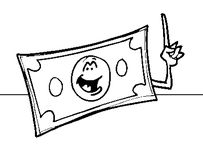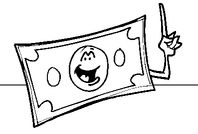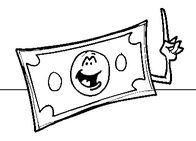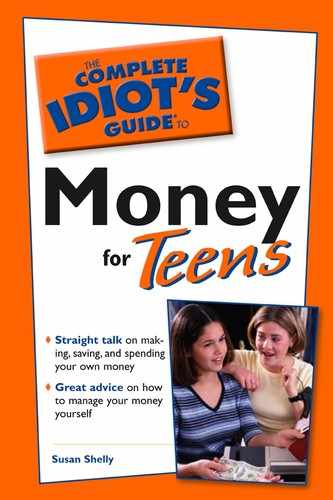
Chapter 6
Money You Might Already Have
In This Chapter
✧ Considering the possibility of unknown money
✧ Understanding assets and liabilities
✧ Figuring out your net worth
✧ Looking ahead to possible sources of money
Some people keep track of all the money they have, right down to the last penny. They can tell you exactly how many dollars they have invested in various accounts, detail their checking and savings account totals, and tell you how much interest they earned in the past quarter or year. For these kinds of people, there are few financial surprises. Others aren’t quite so careful about their money.
Occasionally, there’ll be a story in the newspaper or on TV about some guy who just found out he has half a million in a bank account he’d forgotten even existed or a woman who discovers $100,000 in $50 and $100 bills stashed in a shoebox that her husband kept in his clothes closet until he died. Although something that drastic won’t ever happen to most of us, it might be that you’re not exactly sure of how much money you have and where it is.
If that’s the case, it’s perfectly understandable. Parents, grandparents, other relatives, and friends sometimes open accounts for children, either at birth or for an early childhood birthday or other occasion. If that was the case in your family, it’s possible that you might not even know about it. How would you know, unless you’d been told? It’s possible that the person who opened the account doesn’t pay much attention to it because it’s not a great deal of money. Or, he or she might have wanted to hold the account for you until you were older and could take control of it.
I’d bet that you don’t have half a million dollars sitting around in some account waiting for you, but I wouldn’t be too surprised if there was some extra money with your name on it, somewhere. In this chapter, we look at money you might already have, even if you don’t know it’s there. This will help you to figure out your total assets and your net worth.
Surprise! You Might Have More Than You Know
At this age, you probably don’t have a lot of money to call your own unless someone has placed some in trust for you or there are other unusual circumstances that affect you. You might have bank accounts, and of course there’s that 57 dollars and 46 cents stashed in your bank on the dresser. But maybe there’s some money that you don’t know about. Let’s consider this enticing possibility, shall we?
Happy Birthday, Honey!
As mentioned a bit earlier in this chapter, friends and relatives sometimes open bank accounts for infants and children in the child’s name. These accounts normally aren’t large (but hey, every little bit counts, right?) and sometimes are overlooked or forgotten, even though they remain open.
Another possibility is that your parents have stashed your birthday money from relatives in a special account earmarked for you. I know that my kids both have bank accounts funded primarily by $5, $10, $20, and $50 gifts they’ve received at birthdays or other holidays. Check it out!

Money Matters
It might seem like too much to hope for, but do ask your parents if there might be any bank accounts in your name that you don’t know about. A lot of money in banks is left unaccounted for.
Savings Bonds and So Forth
In addition to bank accounts, you’ll need to explore the possibility that there are bonds or stocks in your name. U.S. savings bonds often are given as birthday presents or contest prizes. For example, you’ll often hear of savings bonds being given as a prize to the winners of a poetry or writing contest sponsored by a school or community group. Giving bonds is a way of giving money that will increase in value over time. You’ll learn more about savings bonds in Chapter 9, “Making Your Money Work for You.”
Some families also give gift shares of stock to children. This is done to introduce kids to the stock market, get them started in a financial venture, or sometimes just for fun. Disney stock is hugely popular among adults buying for kids because the stock certificates have pictures of Mickey, Minnie, Goofy, and other Disney friends. Coca-Cola, McDonald’s, and Pepsi are other popular choices among adults who are buying stock for children.
Make sure you ask whether there might be any stock sitting around with your name on it. Be especially sure to ask about this if there are members of your family who are very involved in buying and trading stock.
Tracking Down Your Assets
At this point of your life, your assets are probably fairly limited. Assets, by the way, are everything on the positive side of your balance sheet.
Some common assets are listed here to give you an idea of what they include:
✧ Bonds and saving bonds. Investments you buy with the understanding that you’ll get your money back—with interest—at the end of an agreed-upon amount of time. They can be issued by corporations or the government.
✧ Cash accounts. Checking and savings accounts are examples.
✧ Certificates of deposit. An investment that pays a fixed interest rate if you keep your money there for a specified length of time. (More about these in Chapter 9.)
✧ Mutual funds. Investments that pool the money of many investors and place it in stocks, bonds, and other holdings. (More about these in Chapter 16, “The Wonderful World of Investments.”)
✧ Stocks. Investments that represent a piece of ownership in a company. (More about stocks in Chapter 16.)
✧ Limited partnerships. A type of legal agreement that allows someone to invest in a business without having to be involved in the day-to-day operations.
✧ Tax refunds. A government reimbursement to people who’ve paid more taxes than they owe.
✧ Treasury bills. A bond or note you buy from the U.S. Treasury that pays you interest.
✧ Cash-value life insurance. A type of life insurance in which part of the premium is used to provide death benefits and part of it is available to earn interest.
Look over the preceding list and see if any of these categories apply to you. Chances are you’ll find at least one or two. Keep them in mind as we move on to consider net worth.
Money and investments earmarked for retirement also must be included when figuring assets:
✧ Annuities. Sources of income that come as equal payments at predetermined intervals. They’re most often associated with insurance companies and retirement programs.
✧ Individual Retirement Account (IRA). (More about these in Chapter 16.)
✧ Keogh account. Another type of retirement savings program.
✧ Pension. Money received from an employer-sponsored retirement plan.
You can see that most of these don’t apply to you. Most teenagers don’t own a home, receive annuities, or participate in a limited-partnership agreement. Still, it’s interesting to know what’s involved when considering what you might have on the plus side.
Figuring Out Your Net Worth
Your net worth—strictly speaking in financial terms—is what you get when you add up all your financial assets, such as those listed previously, and subtract all your financial liabilities.
To understand what that means, you need to know about financial liabilities. Hopefully, your liabilities include nothing more serious than the $10 you borrowed from your brother last week. Some teens, though, have already managed to incur more serious liabilities, which negatively affect their net worth.

Money Matters
If you earned enough money during the year that you have to pay federal income tax, the money you have to pay is listed as a liability against your net worth.
Total assets - total liabilities = net worth.
Some common financial liabilities (most of which don’t apply to teenagers but might be interesting for you to see) are listed in the following:
✧ Alimony. Payment one spouse makes to another in the event of a divorce.
✧ Child support. Payment made by either parent to support a child or children who are living with the other parent or another guardian.
✧ Personal loans. Money owed to an individual such as the $10 you owe to your brother.
✧ Bank loan. Money borrowed from a bank.
✧ Car loans. Money borrowed from a car dealership, bank, or other lending source with the specific intent of purchasing a vehicle.
✧ College loans. Money borrowed for education.
✧ Credit card bills. Money owed to pay for purchases made with a credit card. You’ll learn much more about these nasty things in Chapter 15, “Understanding Credit Cards and Debt.”
✧ Furniture loans. Loan from the store where you bought the furniture or another lender affiliated with that store.
✧ Life insurance loans. Money borrowed against the value of a life insurance policy.
✧ Pension plan loans. Money borrowed against the value of a pension plan.

Scary Stuff
Credit card debt is a liability that affects millions of people. Carrying a lot of credit card debt can drastically reduce your net worth, so think about that the next time you’re tempted to buy something with your Visa card.
Liabilities involved with real estate also must be included:
✧ Residence. This would be a mortgage, including a second mortgage or a line of credit.
✧ Income property. Again, if you owe on a mortgage for the property.
✧ Vacation home. If you have a mortgage on it, it’s considered a liability.
Taxes owed must be included as financial liabilities:
✧ Capital gains tax. Tax on profits from the sale of an investment or asset such as stock or real estate.
✧ Income tax. Tax on the money you earn during the year.
✧ Property tax. Tax assessed on real estate, usually by a municipality or school district.
As you get older, you’ll normally acquire more liabilities such as a car payment, college loans, and maybe a mortgage. Your taxes will be higher, and taxes count as liabilities. The good thing, however, is that you’ll presumably be earning enough money to offset the liabilities.
To be in good financial health, your assets must total more than your liabilities. Or, for you to be okay financially, your assets absolutely can’t be more than your liabilities. With good money management and a bit of luck, your liabilities will be few and your assets many.
Is There Money in Your Future?
We’ve already discussed the possibility of assets existing in your name such as bank accounts, bonds, or stocks. If someone has, indeed, set up an account or purchased bonds or stock on your behalf, they might have intended for you to get the money at a specified time.
Many parents, grandparents, friends, and other relatives establish trust funds, which provide money or other assets to the child when he or she reaches a certain age. The person who establishes the trust fund probably will designate the age at which the assets should be dispersed.
A trust is a legal document, similar to a will, that holds money, property, or other assets for the beneficiary to receive at a designated time in the future. Trust funds can be set up at banks, credit unions, or savings and loans. Some mutual funds also offer trust funds. The institution holding the trust fund determines how much money is required to start the fund, the amount of interest it will pay on money in the fund, and restrictions of withdrawals.
Another way, although a sad one, that you might receive money in the future is if you’re included in someone’s will. A will is a legal document that instructs how a person’s assets are to be divided at the time of his or her death. It also might contain special instructions about how the assets are to be treated or information concerning disposal of the person’s body, funeral services, and so forth.

Money Matters
Money kept in trust for a child can be dispersed in one lump sum, or can be given at intervals specified by the person who established the fund.
You also might someday receive money in the form of scholarships or grants intended for your education. This type of money almost always comes with stipulations and instructions, so don’t get any ideas about using your scholarship money to run off to Europe and spend the summer picking grapes in a French vineyard.
Knowing that you have some money safely tucked away or that there’s money designated for you sometime in the future can provide a great sense of security. It allows you a bit more freedom with the money you earn now, either from allowance or a job you might have.
Don’t, however, get lazy and depend on money that might have been placed somewhere in your name, and don’t ever depend on money that you might—but might not—receive in the future. Many people have counted on inheritances that, for one reason or another, never materialized.
To figure out just how much money you have, count what you earn and any other possible sources. Consider carefully to determine if there’s any money you might not know about, such as money that’s been placed in trust for you, or that’s in an account you don’t know about. Even if there’s money in your name that’s not available to you now, it’s nice to know that it’s waiting for you.
The Least You Need to Know
✧ You might have assets that, for one reason or another, you know nothing about.
✧ These unknown assets could be in the form of bank accounts or investments such as stocks or bonds.
✧ Assets are everything that affect your net worth in a positive way; liabilities are everything that affect it in a negative way.
✧ Your total assets, minus your total liabilities, equal your net worth.
✧ Consider the possibility of future sources of money but don’t depend on them.
..................Content has been hidden....................
You can't read the all page of ebook, please click here login for view all page.
